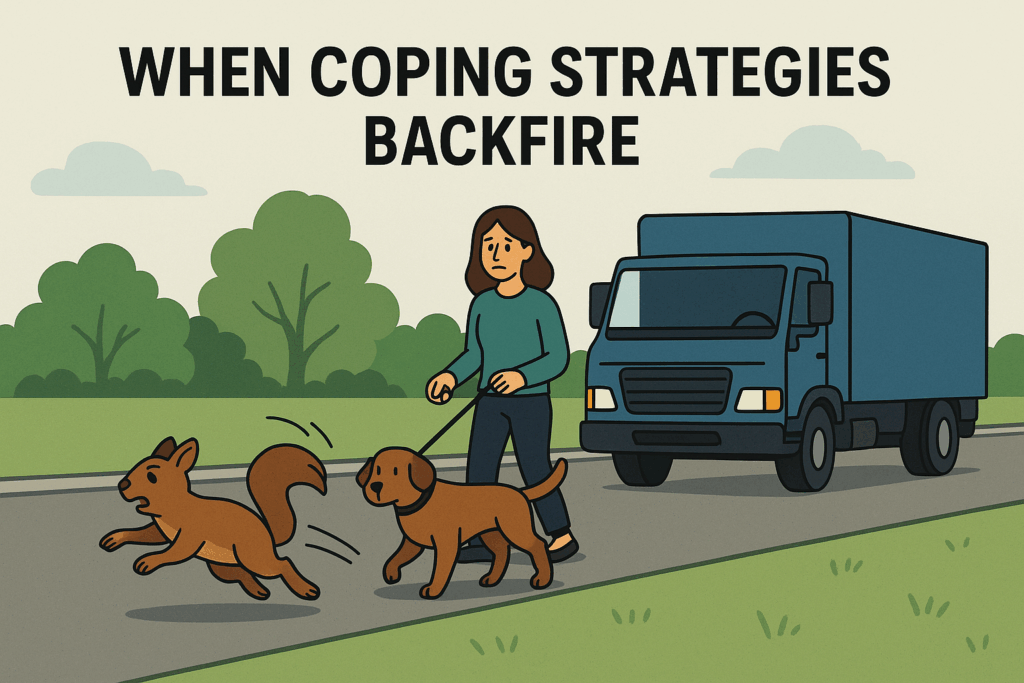How trying to feel safer can sometimes make things harder — and what can help
You’re working hard, doing well — but still doubting yourself. Maybe you lie awake replaying a conversation from earlier, worrying you said the wrong thing. Or you stay late, double-checking your work just one more time. Deep down, there’s a fear that, despite everything, you’re not good enough — and that one day, others will realise it too.
If that sounds familiar, you’re not alone. These are common signs of imposter syndrome — and while they often go unnoticed from the outside, they can quietly take a heavy toll.
What Is Imposter Syndrome?
Imposter syndrome shows up as a persistent sense of not being good enough, even in the face of clear evidence that you’re doing well. You might feel like you’re faking it, or that any success you’ve had is down to luck, timing, or other people’s kindness.
These feelings are often rooted in fear — the fear of being exposed, judged, or falling short. And when that fear gets triggered, it leads to all kinds of efforts to avoid it.
-
You work extra hours, preparing for every possible outcome.
-
You aim for perfection, just to avoid mistakes.
-
You play it safe, avoid risks, overthink decisions, or procrastinate.
These strategies might bring short-term relief. But in the long term, they can reinforce the very doubts you’re trying to escape.
When Anxiety Is Just Trying to Help
From the outside, these behaviours can look like high standards or dedication. But inside, they’re often driven by anxiety — and it’s important to know that anxiety isn’t the enemy here.
Anxiety is part of your threat system. It’s there to protect you from danger — and when you live with imposter syndrome, situations where you might be judged (at work, in relationships, in performance settings) can feel risky.
So anxiety steps in to help. It says:
“Let’s just get everything perfect so no one can criticise you.”
“Let’s avoid that meeting so you don’t get caught out.”
“Let’s stay up and triple-check your work — just in case.”
The intention is safety — but the result is often more stress, more self-doubt, and more pressure.
Out of the Frying Pan and Into the Fire: The Squirrel Story
I once saw a perfect example of this while out running.
Up ahead, a squirrel noticed me approaching and darted away in fear. But in trying to escape me, it ran straight toward a woman with a dog — which set off another panic response, sending it across a road and into oncoming traffic.

Thankfully, the van approaching slowed just in time, and the squirrel made it to safety.
Its instincts were trying to protect it — but the rushed escape actually created more danger.
This is often how imposter syndrome plays out: the strategies we use to cope (overworking, avoiding, over-preparing) are intended to help us feel safer — but they often leave us more exhausted, more stuck, and more convinced we’re not enough.
The Cost of Coping
The ongoing pressure to prove yourself — or avoid being “found out” — can start to bleed into every part of life.
-
Burnout from long hours and never switching off
-
Avoidance of new opportunities because they feel too risky
-
Overthinking and perfectionism that make even simple tasks feel overwhelming
-
Loneliness from holding back your true thoughts or avoiding being seen too closely
And because successes don’t “fit” with how you feel inside, you might dismiss them — telling yourself it was luck, or that you didn’t really earn it.
How Therapy Can Help
Therapy can help you understand these patterns — not just where they come from, but how they’re being maintained in your day-to-day life.
One approach I often use is Cognitive Behavioural Therapy (CBT), which can support you to:
-
Spot the unhelpful thinking and behaviour patterns that keep self-doubt in place
-
Explore what happens when you step back from the inner critic or test new ways of responding
-
Build more supportive and balanced patterns that reflect your values and strengths
-
Develop greater self-awareness and compassion — especially in moments of struggle
Alongside CBT, I also draw on approaches like ACT, CFT, and EMDR, depending on what’s most helpful for you.
Over time, you can shift from surviving these feelings to understanding and softening them — and begin relating to yourself in a way that’s more grounded, less driven by fear, and more in line with who you truly are.
Final Thoughts
Imposter syndrome is more common than you might think — and it’s not a sign of weakness or failure. It’s a pattern rooted in understandable fears, shaped by past experiences, and maintained by strategies that were meant to help.
But with the right support, you can learn to respond differently. You can begin to let go of the pressure to constantly prove yourself — and instead focus your energy on what really matters to you.
If this sounds like something you're navigating, I’d be happy to explore how therapy might help.

